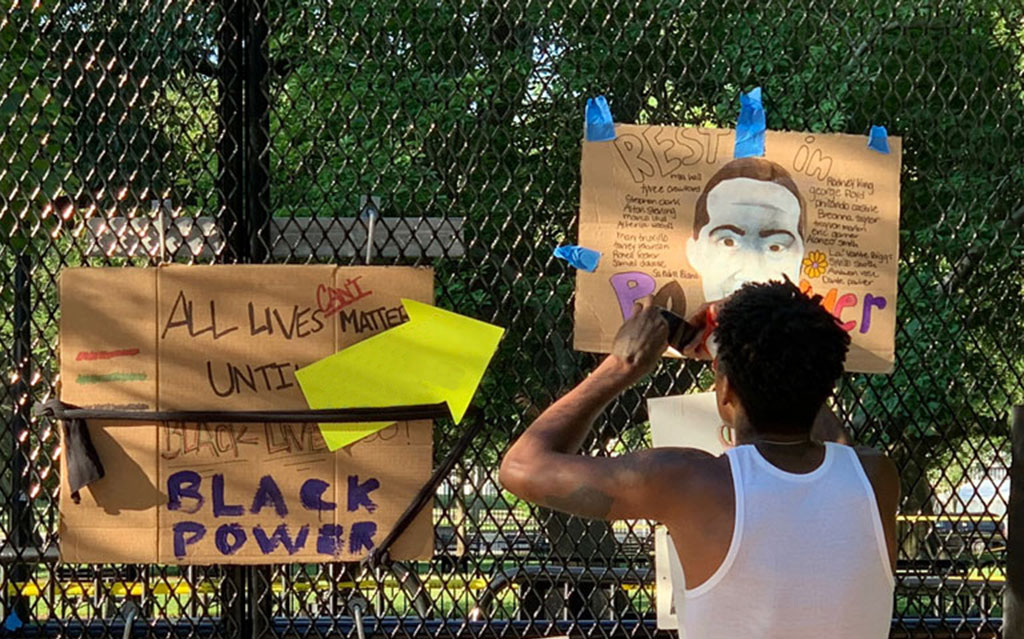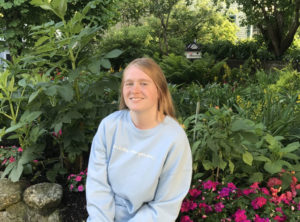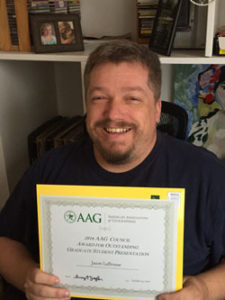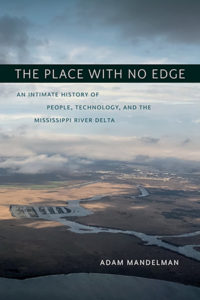AAG Journal Articles on Black Geographies and Racial Justice

The following titles reflect vital scholarship on Black Geographies in AAG’s journals in recent years. Through September 30, 2025, AAG and Taylor & Francis are providing free access to these articles, available for download at the links listed below.
For additional reading recommendations, see Black Geographies Reading List, sponsored by the AAG Black Geographies Specialty Group.
- Alderman, Derek H. A Street Fit for a King: Naming Places and Commemoration in the American South
- Alderman, Derek H.; Paul Kingsbury; and Owen J. Dwyer. Reexamining the Montgomery Bus Boycott: Toward an Empathetic Pedagogy of the Civil Rights Movement
- Baran, Ian, and David L. Phoenix. Spaces of Learning: Pedagogy and Movement Building Within the Black Panther Party
- Barwick, Daniel, and Anoop Nayak. The Transnationalism of the Black Lives Matter Movement: Decolonization and Mapping Black Geographies in Sydney, Australia.
- Belanger, Elizabeth. Working-Class Mobility and Streetcar Politics in Reconstruction-Era St. Louis,
- Berry, Rachelle; Jennifer Rice; Amy Trauger; Haley DeLoach; Amelia Wheeler; and Alice Hilton. Wake Work: Unearthing the Legacy of Slavery at the United States’ First Publicly Chartered University
- Best, Asha. The Way They Blow the Horn: Caribbean Dollar Cabs and Subaltern Mobilities
- Biehler, Dawn, Shannon LaDeau, Joel Baker, Yinka Bode-George, J. H. Pitas, Rebecca C. Jordan, Paul Leisnham & Sacoby Wilson. Segregation Histories, Wealth, and Community Engagement Shape Inequitable Burdens of Urban Greening
- Bledsoe, Adam. Neither Ground on Which to Stand, nor Self to Defend: The Structural Denial (and Radical Histories) of Black Self-Defense
- Bledsoe, Adam. Afro-Brazilian Resistance to Extractivism in the Bay of Aratu
- Bledsoe, Adam. Neither Ground on Which to Stand, nor Self to Defend: The Structural Denial (and Radical Histories) of Black Self-Defense
- Bruno, Tianna. Ecological Memory in the Biophysical Afterlife of Slavery
- Bruno, Tianna; and Cristina Faiver-Serna. More Reflections on a White Discipline
- Cahuas, Madelaine. Building a Holistic Intersectional Feminist Praxis in Geography: Lessons from Community
- Carter, Perry L. Art Works: Rendering the Absence Present by Bearing Witness at the National Memorial for Peace and Justice
- Chari, Sharad. Subalternization of a Postplantation City
- Chennault, Carrie; & Lynn Sutton. At Home: Black Women’s Collective Claims to Environmentally Just Rental Housing
- Combs, H. Jason. The South’s Slave Culture Transplanted to the Western Frontier
- Cope, Meghan; and Frank Latcham. Narratives of Decline: Race, Poverty, and Youth in the Context of Postindustrial Urban Angst
- Crawford, Madyson. An Ode to Belonging: Southern Black Women’s Politics of Belonging Through Storytelling
- Delaney, David. The Space That Race Makes
- Edgett, Kayla. Black Self-Defense as Social Reproduction: Geographies of Insurgency and Counterinsurgency Amidst Racialized Uneven Development in Atlanta
- Faria, Caroline; Bisola Falola; Jane Henderson; and Rebecca Maria Torres. A Long Way to Go: Collective Paths to Racial Justice in Geography
- Freshour, Carrie; and Brian Williams. Toward “Total Freedom”: Black Ecologies of Land, Labor, and Livelihoods in the Mississippi Delta
- Gilmore, Ruth Wilson. Fatal Couplings of Power and Difference: Notes on Racism and Geography
- Grady, Sue; and Joe Darden, Spatial Methods to Study Local Racial Residential Segregation and Infant Health in Detroit, Michigan
- graham-jackson, april; and Robert Moeller. Black Scale: Constructing “Haunted” Overpasses as Relational Methodologies
- Granger, Orman E. The Hydroclimatonomy of a Developing Tropical Island: A Water Resources Perspective
- Guthman, Julie. “If They Only Knew”: Color Blindness and Universalism in California Alternative Food Institutions
- Hamilton, Aretina R; and Kenneth Foote. Police Torture in Chicago: Theorizing Violence and Social Justice in a Racialized City
- Harwood, Stacy Anne; Ruby Mendenhall; Sang S. Lee; Cameron Riopelle; and
- Margaret Browne Huntt. Everyday Racism in Integrated Spaces: Mapping the Experiences of Students of Color at a Diversifying Predominantly White Institution
- Heynan, Nik. Back to Revolutionary Theory Through Racialized Poverty: The McGee Family’s Utopian Struggle for Milwaukee
- Howell, Philip; and Ilanah Taves. Black Protest and the Man on Horseback: Race, Animality, and Equestrian Counter-Conduct
- Holloway, Steven R.; Richard Wright; and Mark Ellis. The Racially Fragmented City? Neighborhood Racial Segregation and Diversity Jointly Considered
- Huang, Xiao; Xiaoqi Bao; Zhenlong Li; Shaozeng Zhang; and Bo Zhao. Black Businesses Matter: A Longitudinal Study of Black-Owned Restaurants in the COVID-19 Pandemic Using Geospatial Big Data
- Ignatov, Anatoli. African Orature as Ecophilosophy: Tuning in to the Voices of the Land
- Inwood, Joshua. The Modern Infrastructure Landscape and the Legacy of Slavery
- Inwood, Joshua; and Derek Alderman. “The Care and Feeding of Power Structures”: Reconceptualizing Geospatial Intelligence through the Countermapping Efforts of the Student Nonviolent Coordinating Committee, 2019.
- Jordan, Demetrice; Ashton Shortridge; and Joe T. Darden. The Advancing Geography Through Diversity Program: A Framework to Address the Persistent Underrepresentation of Domestic Racial and Ethnic Minorities in U.S. Geography Doctoral Programs
- Kelly, Meghan. The Gallery of Possibilities
- Klocker, Natascha and Paul Mbenna. Inheriting Racial Privilege and Oppression Through Proximity: Evidence from the Everyday Lives of Mixed-Race Couples in Australia
- Kobayashi, Audrey. The Dialectic of Race and the Discipline of Geography
- Meehan, Katie; Mabel Denzin Gergan; Sharlene Mollett; and Laura Pulido. Unsettling Race, Nature, and Environment in Geography
- Mburu, Lucy W.; and Marco Helbich. Commuter-Harmonized Ambient Population
- McCutcheon, Priscilla. “When and Where I Enter”: The National Council of Negro Women, Black Women’s Organizing Power, and the Fight to End Hunger
- Modlin, E. Arnold; Stephen P. Hanna; Perry L. Carter; Amy E. Potter; Candace Forbes Bright; and Derek H. Alderman. Can Plantation Museums Do Full Justice to the Story of the Enslaved? A Discussion of Problems, Possibilities, and the Place of Memory
- Mollett, Sharlene. Mapping Deception: The Politics of Mapping Miskito and Garifuna Space in Honduras
- Moore, Adam; and Nour Joudah. The Significance of W.E.B. Du Bois’s Decolonial Geopolitics
- Mullings, Beverley. Sides of the Same Coin?: Coping and Resistance among Jamaican Data-Entry Operators
- Noxolo, Patricia; and Marika Preziuso. Approaching a “Fictionable” World through the Novels of Maryse Condé and Wilson Harris
- Osborne, Tracey; and Elizabeth Shapiro-Garza. Complicating Commodification of Ecosystem Services in Mexico’s Forests
- Palmer, Mark; and Robert Rundstrom. GIS, Internal Colonialism, and the U.S. Bureau of Indian Affairs
- Peake, Linda; and Audrey Kobayashi. Policies and Practices for an Antiracist Geography at the Millennium
- Ponder, C.S. Spatializing the Municipal Bond Market: Urban Resilience under Racial Capitalism
- Pulido, Laura. Rethinking Environmental Racism: White Privilege and Urban Development in Southern California
- Pulido, Laura. Reflections on a White Discipline
- Pulido, Laura; Tianna Bruno; Cristina Galentine. Environmental Deregulation, Spectacular Racism, and White Nationalism in the Trump Era
- Purifoy, Danielle. Black Towns and (Legal) Marronage
- Rhiney, Kevon; Chris Knudson; & Zack Guido. Cultivating Crisis: Coffee, Smallholder Vulnerability, and the Uneven Sociomaterial Consequences of the Leaf Rust Epidemic in Jamaica
- Roberts, Andrea; and Maia L. Butler. Contending with the Palimpsest: Reading the Land through Black Women’s Emotional Geographies,
- Rose, Harold M. The Development of an Urban Subsystem: The Case of the Negro Ghetto
- Rose, Harold M. The Geography of Despair.
- Scott, Darius. Good Roads and Anti-Black Violence
- Scott, Darius. Normalized Alterity: Visualizing Black Spatial Humanities
- Shimshon-Santo, Amy. How to Become Erasure Proof
- Thompson, Ki’Amber. Toward a World Where We Can Breathe: Abolitionist Environmental Justice Praxis
- Torres, Rebecca Maria. Everyday Encounters with Activist Scholarship
- Tretter, Eliot M. The Power of Naming: The Toponymic Geographies of Commemorated African-Americans
- Vasudevan, Pavithra; Margaret Marietta Ramírez; Yolanda González Mendoza; and Michelle Daigle. Storytelling Earth and Body
- Vickers, Morgan. On Swampification: Black Ecologies, Moral Geographies, and Racialized Swampland Destruction
- Wilson, Bobby. Race in Commodity Exchange and Consumption: Separate but Equal
- Wilson, Bobby. Critically Understanding Race-Connected Practices: A Reading of W. E. B. Du Bois and Richard Wright
- Wilson, David. Introduction: Racialized Poverty in U.S. Cities: Toward a Refined Racial Economy Perspective
- Winders, Jamie; and Richard Schein. Race and Diversity: What Have We Learned?
Winston, Celeste. Maroon Geographies - Wood, Astrid. Bringing Transport into Black Geographies: Policies, Protests, and Planning in Johannesburg
- Woods, Clyde. Life After Death
- Wright, Dawn J.; Sally L. Duncan; and Denise Lach. Social Power and GIS Technology: A Review and Assessment of Approaches for Natural Resource Management
- Wright, Dawn J.; Michael F. Goodchild; and James D. Proctor. Demystifying the Persistent Ambiguity of GIS as ‘Tool’ versus ‘Science’
- Wright, Willie Jamaal. The Morphology of Marronage
- Wright, Willie Jamaal. The Public Is Intellectual
- Wright, Willie Jamaal, Adam Bledsoe, Priscilla Ferreira, Kristen Maye & Ellen Louis. Beyond Geographies of Race
- Wyly, Elvin K. Race, Gender, and Spatial Segmentation in the Twin Cities
- Yu, Shaolu. Placing Racial Triangulation, Triangulating Place and Race: Chinese Grocery Stores in the Mississippi Delta during the Jim Crow Era
 Meghan Dilworth is a senior at Arizona State University (ASU), pursuing a B.A. in Geography and Urban Planning. Meghan has been a Teaching Assistant/Mentor in the ASU Geography department for three years. Additionally, she has worked as a Geography Content Curator at SolarSPELL, a company that collects geography and educational information for people in areas that don’t have access to the internet or traditional libraries, such as East Africa or the Pacific Islands. In her spare time Meghan’s interests include travel, snow skiing, horseback riding and gymnastics.
Meghan Dilworth is a senior at Arizona State University (ASU), pursuing a B.A. in Geography and Urban Planning. Meghan has been a Teaching Assistant/Mentor in the ASU Geography department for three years. Additionally, she has worked as a Geography Content Curator at SolarSPELL, a company that collects geography and educational information for people in areas that don’t have access to the internet or traditional libraries, such as East Africa or the Pacific Islands. In her spare time Meghan’s interests include travel, snow skiing, horseback riding and gymnastics. Samantha Hinton was born and raised in New York City where she graduated from The Spence School. She currently attends Trinity College Dublin, pursuing a B.A. major in Geography. At Trinity, she is the geography library undergraduate representative, a Student 2 Student Mentor, part of the women’s soccer team, and the treasurer of the Geographical Society. She has spent the last six months doing her Erasmus at Utrecht University in The Netherlands. Samantha chose to apply for geography because she is passionate about appreciating the outdoors. With geography, she strives to learn more about the intersection and impact between humans, space, and the environment. While not working, she enjoys traveling, making art, and playing sports.
Samantha Hinton was born and raised in New York City where she graduated from The Spence School. She currently attends Trinity College Dublin, pursuing a B.A. major in Geography. At Trinity, she is the geography library undergraduate representative, a Student 2 Student Mentor, part of the women’s soccer team, and the treasurer of the Geographical Society. She has spent the last six months doing her Erasmus at Utrecht University in The Netherlands. Samantha chose to apply for geography because she is passionate about appreciating the outdoors. With geography, she strives to learn more about the intersection and impact between humans, space, and the environment. While not working, she enjoys traveling, making art, and playing sports.






 Eliana Peretz is a senior at Mount Holyoke College pursuing a B.A. in Geography and Gender Studies. After graduation, she plans to pursue a master’s degree in her main field of interest, climate migration, specifically studying the relationship between climate-induced displacement and social and cultural categories such as class, gender, and race. In her spare time, Eliana likes to make post-it art, read murder mystery novels, and watch stand up comedy.
Eliana Peretz is a senior at Mount Holyoke College pursuing a B.A. in Geography and Gender Studies. After graduation, she plans to pursue a master’s degree in her main field of interest, climate migration, specifically studying the relationship between climate-induced displacement and social and cultural categories such as class, gender, and race. In her spare time, Eliana likes to make post-it art, read murder mystery novels, and watch stand up comedy.

 Adam Mandelman, The Place with No Edge: An Intimate History of People, Technology, and the Mississippi River Delta (LSU Press, 2020)
Adam Mandelman, The Place with No Edge: An Intimate History of People, Technology, and the Mississippi River Delta (LSU Press, 2020)



 John Frazier, Binghamton University
John Frazier, Binghamton University Heather Bedi, Dickinson College
Heather Bedi, Dickinson College Mei-Po Kwan, The Chinese University of Hong Kong
Mei-Po Kwan, The Chinese University of Hong Kong Dawn Wright, Esri
Dawn Wright, Esri Ilan Gritzman recently graduated from the University of Central Florida with a Bachelor’s of Science in Public Administration and a minor in Urban and Regional Planning. Ilan has previously interned for Smithsonian Libraries on the World of Maps project, participated in a GIS study abroad in Belize, and served as a research assistant for Citizen Science GIS. He currently also collects and maps data on apartment units across Florida as a city surveyor for One Hundred Feet Inc. Ilan intends to pursue an M.A. in Urban and Regional Planning and secure a full-time position in either urban planning or GIS upon graduation. In his spare time, Ilan likes to cycle, play tennis, travel, and watch sports.
Ilan Gritzman recently graduated from the University of Central Florida with a Bachelor’s of Science in Public Administration and a minor in Urban and Regional Planning. Ilan has previously interned for Smithsonian Libraries on the World of Maps project, participated in a GIS study abroad in Belize, and served as a research assistant for Citizen Science GIS. He currently also collects and maps data on apartment units across Florida as a city surveyor for One Hundred Feet Inc. Ilan intends to pursue an M.A. in Urban and Regional Planning and secure a full-time position in either urban planning or GIS upon graduation. In his spare time, Ilan likes to cycle, play tennis, travel, and watch sports. Jennifer Church is a senior at The University of Maryland, pursuing a B.S. in Environmental Science and Policy with a concentration in Land Use and a minor in Nonprofit Leadership and Social Innovation. After graduation, Jennifer hopes to have the opportunity to travel before applying for a Masters program in Geography. In her spare time, she enjoys skiing, kayaking, and embroidering.
Jennifer Church is a senior at The University of Maryland, pursuing a B.S. in Environmental Science and Policy with a concentration in Land Use and a minor in Nonprofit Leadership and Social Innovation. After graduation, Jennifer hopes to have the opportunity to travel before applying for a Masters program in Geography. In her spare time, she enjoys skiing, kayaking, and embroidering.